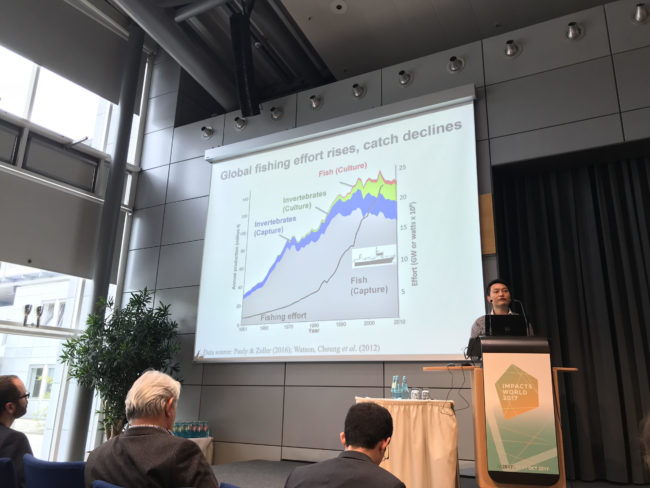From October 11 to 13, Nereus Program Fellow Gerald Singh, Research Associate Tyler Eddy, and Director of Science William Cheung attended the Impacts World Conference 2017, the international conference on climate change impacts for scientists and stakeholders, in Potsdam, Germany.
“The intersectoral and interdisciplinary nature of the ISIMIP approach meant that topics were very broad and spanned both land and sea, natural science, social science, economics, human health, and policy,” said Tyler Eddy. “This perspective was very interesting to consider big ideas and issues at broad scales, however as a result of this broad approach, detailed ocean processes weren’t covered as much.”
Attendance included participation from over 500 academics, policy makers, NGOs, noble laureates, ministers, and stakeholders. Attendees addressed four key challenges for quantifying the true costs of climate change, including the economic costs, human health, human migration, and the Sustainable Development Goals.
“Health is challenging the responses to climate impacts particularly in vulnerable communities,” said Cheung. “One of the plenary speakers talked about malnutrition challenges mental capacity to response to and deal with problems, which is a vicious cycle as environmental/societal problems may lead to malnutrition in vulnerable communities, it reduces their capacity to deal with the problems. Thus, it highlights the need to address some fundamental wellbeing issues in order to meet the challenge of sustainable development.”
Cheung delivered a plenary talk on the ‘Future sustainability of seafood production under climate change.’ In his speech, Cheung addressed the integrated topics of growing seafood demands, elevated fishing efforts, and decreasing catches within the scope of climate change.

William Cheung presents at Impacts World 2017. Image by Tyler Eddy.
Tyler Eddy convened a workshop on the ‘Land & sea interfaces of the SDGs’ for which Singh presented on ‘A rapid assessment tool determining co-benefits and trade-offs among Sustainable Development Goals: results for the role of the oceans in sustainable development.’
The workshop included discussion groups to address three different key questions:
– how can land and sea interactions be better represented in socioeconomic pathways used in climate model projections?
– what data or methods are missing to address these interactions?
– and how do we ensure that this information is relevant to policy makers?
A paper is being produced on this discussion.



